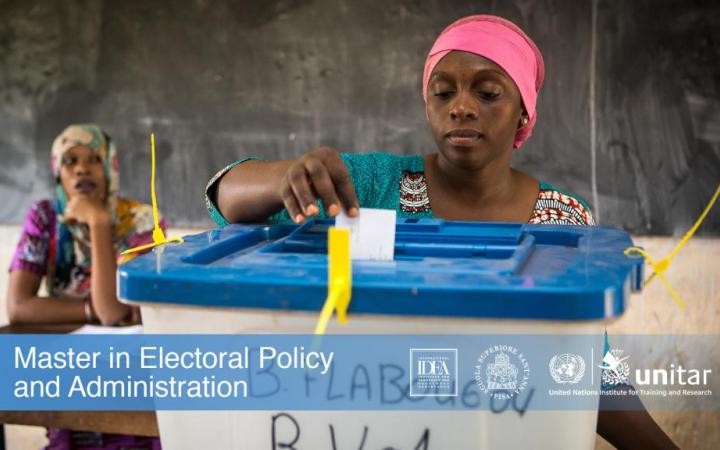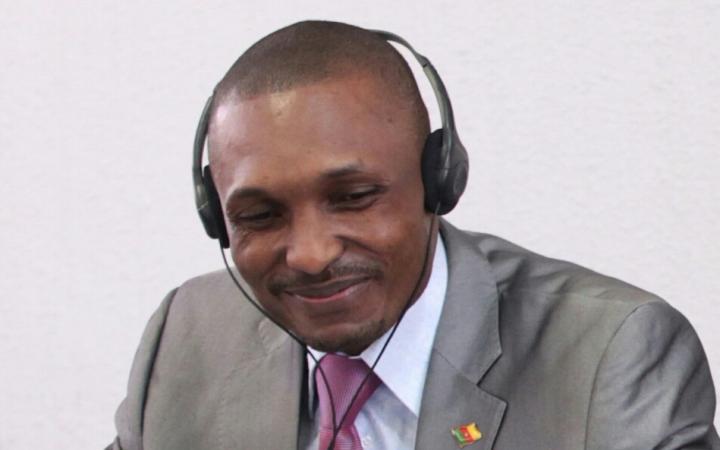APPLICATIONS OPEN! REGISTER BEFORE 21st SEPTEMBER FOR THE FALL EDITION! APPLY NOW
The Master in Electoral Policy and Administration (MEPA) aims to provide advanced learning on electoral processes for current and aspiring election professionals by drawing on the expertise of the United Nations Institute for Training and Research (UNITAR), the Scuola Superiore Sant’Anna and the International Institute for Democracy and Electoral Assistance (International IDEA) through a network of field practitioners and world-leading academics and electoral experts.
The Master’s diploma focuses on the development of electoral professionals, i.e. professionals who share a common set of norms, behavioural standards, and qualifications to assume specific roles and responsibilities in the area of electoral policy and administration. Responding to a global structural demand for qualified electoral professionals, the Master is based on a systematic and comprehensive approach to the professional development of those enrolled and places particular emphasis on the importance of advancing equal career opportunities for men and women.
NEW CALL for the Spring Edition has been launched and the Master Program is available in English, French, Portuguese, and Arabic. New modules currently include Managing Elections in Public Emergency Situations, Elections in Fragile / Post Conflict contexts, Leadership in Electoral Administration, Gender and Elections, and Electoral Logistics.
MEPA is composed of an online component (9 months) and an optional residential component at the Scuola Superiore Sant’Anna in Pisa, Italy (up to 3 weeks). Internships are encouraged but not compulsory in order to earn the Master's diploma.
This programme is part of InnovElections project.
IMPORTANT DATES
Fall Edition
- Starts on the 12th of October 2023
- Apply before the 21st of September, 2023
Spring Edition
- Starts on the 12th of April 2024
- Apply before the 22nd of March 2024
Approach
A distinctive student-centered, multidisciplinary approach, in which the workplace is used as the main learning environment.
UNITAR has developed an extensive expertise in the delivery of online programmes. Using Internet as a medium, students, practitioners and scholars are brought together in a unique virtual learning environment designed to valorize experiential and collaborative learning.
Distinctive features of the Master include:
- Full online delivery, allowing for a flexible schedule designed to fit the specific needs of full-time working professionals;
- Student-centered approach, in which the learner and the learning experience at the core of the programme;
- Leading-edge insights into prevailing theories and practices;
- Lifelong learning approach, in which the workplace is used as the main learning environment;
- Multi-cultural pedagogy, particularly attentive at the diversity of paradigms, perceptions and intellectual traditions;
- Multi-disciplinary approach.
Curriculum
Students benefit from an experienced faculty of scholars and practitioners, peer-to-peer collaboration, and a curriculum that reflects current theory and practice.
- Elections and Voting as Instruments of Governance (2 ECTS credits) – Compulsory
- Electoral Legal and Regulatory Frameworks (3 ECTS credits) – Compulsory
- Electoral Management Bodies (EMBs) (3 ECTS credits) – Compulsory
- Electoral Systems and Managing Representation (3 ECTS credits) – Compulsory
- Understanding and Managing Boundary Delimitation (3 ECTS credits) – Optional
- Political Parties, Campaigns, and Political Finance (3 ECTS credits) – Compulsory
- Electoral Planning and Budgeting (3 ECTS credits) – Compulsory
- Electoral Logistics (4 ECTS credits) – Optional
- Voter Registration and Identification Systems (3 ECTS credits) – Compulsory
- Electoral Operations (3 ECTS credits) – Compulsory
- Gender and Elections (2 ECTS credits) – Optional
- Marginalized Electorates and Special Voting Programs (2 ECTS credits) – Compulsory
- Managing Elections in Public Emergency Situations (3 ECTS credits) – Optional
- Election Integrity in the Digital Age (3 ECTS credits) – Optional
- Civic and Voter Education (2 ECTS credits) – Optional
- Media and Elections (2 ECTS credits) – Optional
- Electoral Integrity and Malpractice (4 ECTS credits) – Compulsory
- Managing Electoral Security, Electoral Violence, and Preventing Election-related conflicts (2 ECTS credits) – Optional
- Elections in Fragile / Post Conflict contexts (3 ECTS credits) – Optional
- Electoral Justice Systems (3 ECTS credits) – Compulsory
- Electoral Observation, Evaluation, and Validation (3 ECTS credits) – Optional
- Policy Advice and Electoral Reform (3 ECTS credits) – Compulsory
- Direct Democracy (2 ECTS credits) – Optional
- Leadership in Electoral Administration (2 ECTS credits) – Optional Module
The Master in Electoral Policy and Administration is awarded upon completion of 62 ETCS. Students may alternatively opt to register for individual modules which will grant between 2 and 5 ETCS.
At the end of the Master Programme, those students, who have regularly settled the tuition costs and have passed all the required examinations and successfully presented the Master Thesis, will receive from Scuola Superiore Sant’Anna a First Level Master’s Diploma, in accordance with art. 3 of the Italian DM no. 270/2004. The degree is awarded according to the rules and regulations set by the Italian and the EU education system. Giving its specificity, it does not give general access to Doctoral studies (Phd and similar). Validation of credits for access to such programmes can be requested from competent institutions.
Duration
The average duration of the Master in Electoral Policy and Administration is 12 months. The average duration of the individual modules is between 20 to 40 hours (depending on the specific module chosen).
Application Information
Applicants must meet the following minimum requirements:
- Three-year (at least) university degree in a relevant field, combined with some (ideally at least six months) working experience in the field of electoral policy and administration or related areas. Students expecting to graduate within a period of three months from the application are also eligible.
- Fluency in English – at least at the level B2 (please refer to: CEFR for Languages, CoE, www.coe.int/lang-CEFR ).
Application Instructions
The Project Managers are available to help students during the application process. Students are encouraged to email the Project Managers at mepa@santannapisa.it with any questions.
Applicants are selected on the basis of the information provided in their CVs and in the online application form which is available at www.mastermepa.santannapisa.it.
Required supporting documentation
- CV
- Passport/ ID
- Grade transcript of the Bachelor's degree (not only the diploma)
Application Deadlines (2023-2024)
Applications are accepted on a rolling basis. However, to be considered for a specific semester, please submit your application not later than:
- 21st September 2023 - to start 12th of October 2023
- 22nd March 2024 - to start 12th April 2024
Admitted participants will be informed about the results within 8 weeks from their application.
In case of problems with the online procedure, please contact mepa@santannapisa.it.
Tuition Fees
The tuition fee for the full programme is EUR 10,000, payable in three installments.
Individual modules are also available. The fee for each MEPA module is EUR 850. Starting from the second module, a 10% discount on the fee of the second and the third modules is applied and a 15% discount is applied for the fourth and the fifth modules. It is possible to select up to 5 modules. The fee for an individual module shall be paid in one tranche.
For more information, please contact us at mepa@unitar.org.
FISCHER FAMILY SCHOLARSHIP
The Fischer Family Scholarship is an award of €5,000 granted to one student which has been admitted in the selection procedure pertaining to the Master in Electoral Policy and Administration (MEPA) program at the Scuola Superiore Sant’Anna. This scholarship is attributed to cover half of the tuition costs of the Master for the 2022 April Intake.
The student should be professionally engaged / or intends to be engaged in some aspect of electoral conflict prevention and electoral security. The candidates could thus be staff working in electoral security departments at Electoral Management Bodies, or individuals working for organizations or as consultants with a conflict prevention and mediation focus.
In applying for the scholarship, the student will be asked to provide a cover letter addressed to Jeff Fischer. In the latter, they should explain how they are engaged in electoral security and where they see their career path taking them in this field.
Apply Now
To apply, click here and follow the instructions.
"The broader view is what I find truly awesome about MEPA. There is no definition of democracy as American or democracy as South African. Democracy is not limited to a particular country, and this should always be borne in mind while selecting course materials".
Henry Atem Oben, Executive Director, United States Center for Electoral Support, USA
FREQUENTLY ASKED QUESTIONS
If you did not find the information you were searching for, try consulting our FAQ page.
Contacts
Should you need any guidance or additional information, please contact us at:
United Nations Institute for Training and Research (UNITAR)
Division for Peace
Avenue de la Paix 7 bis, CH-1202, 2 Geneva, Switzerland
E-mail: mepa@unitar.org
Scuola Superiore Sant’Anna
Via Cardinale Maffi, 27
56126 Pisa, Italy
E-mail: mepa@santannapisa.it
Website: www.mepa.dirpolis.sssup.it




